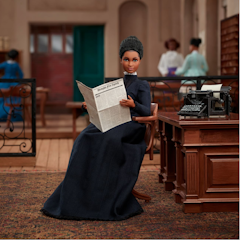
Articles on Children's play
Displaying 1 - 20 of 26 articles

Kindergarteners’ literacy and active play are both grounded in the science of learning.

Children can transform ordinary items into extraordinary play scenes with Barbie and Barbie-like dolls.

A unique dataset from 32 children on 36 different play dates provided the opportunity to study how young children develop peer relationships, and how consistent they are with different children.

How should we understand what toys or ‘loose part’ materials support children’s play, and what’s the relationship of parents’ education and income to this? A study aims to find out.

Parenting is difficult and there can be added pressure and stress during holidays. Creating safe, secure, loving environments and being present with your children is the greatest gift you can give.

The new playground in Melbourne’s Southbank is the work of artist Mike Hewson – and it’s exactly the ‘risk’ it proposes that makes it so valuable.

Some finds toys for toddlers based on digital devices a bit confronting. But really they’re just updated versions of traditional toys for make-believe play such as doctor and tradie tool sets.

Dads and caregivers play important roles in supporting the development of loving relationships.

Parents in a study discussed barriers and opportunities in encouraging children’s physical movement during COVID-19 — from arguing about warm clothing for outdoor play to finding local hiking trails.

Making daily time to connect with their children is an important way of nurturing family experiences and relationships and to find restoration.

Black children are prone to internalize messages of anti-Blackness. Can a Black doll that honors one of America’s most noteworthy Black women do anything to reverse the trend?

Problems include no fields, no courts for games, no playgrounds, no bike racks and no traffic-calming surrounding the school. Bringing in minimum standards is important.

Encouraging a child to hold their paint brush to develop a pincer grip while the child is involved in painting is one example of guided play.

Communicating clearly with children and providing space for them to play will be vital during back-to-school and beyond as children manage stressors associated with COVID-19.

There’s not enough scholarly evidence to suggest game companies can control our minds or our wallets.

Supporting play begins with parents attending to their own wellness and seeing children as drivers of their own play.

Digital play can be a great substitute for play in the physical world. Research shows playing on a screen builds many of the same skills.

Global experts in child development say recess will be critical for children’s well-being when schools reopen, so education authorities should see planning recess as a high priority.

One father was fined for rollerblading with kids in a parking lot, while other families hit the cottage. Families’ backyard or property status should not determine kids’ right to outdoor play.

P.L.A.Y.: An acronym to remind you why letting children play is a responsible and critical way to support children’s development through the COVID-19 pandemic.
